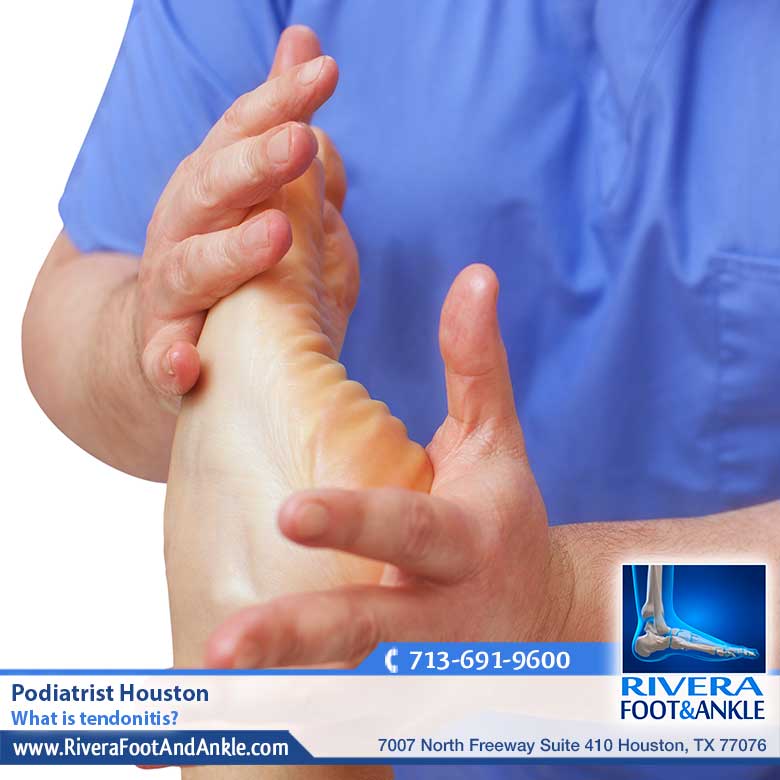
Podiatrist Houston
What is tendonitis?
Tendonitis (also known as tendinitis) is the irritation or inflammation of a tendon. A tendon is a cord-like band of tough fibrous connective tissue that attaches a muscle to a bone. (Ligaments, which are also similarly made up of collagen, connect bone to bone.)
Tendons are distributed all over the body including the arms, legs, hands, feet, head, and torso. They come in various shapes and sizes, but they all work to transfer the force of muscle contraction to produce movement of a body part.
To indicate which tendon is affected by injury or inflammation, tendonitis is often referred to by the affected body part, for example, patellar tendonitis (knee) or Achilles tendonitis (ankle).
What causes tendonitis?
There are several causes of tendonitis, ranging from infection and disease to traumatic injury and overuse. Although tendonitis can occur at any age, it is most common in adults over 40. This is because, in older people, the tendons are less likely to tolerate stress and are more prone to tears and injury. The most commonly affected sites include the ankle, knee, hip, shoulder, elbow, and base of the thumb. Jumper’s knee, tennis elbow, and swimmer’s shoulder are all types of tendonitis.
Common causes of tendonitis include:
- Overuse or frequent repetitive movement – examples include jobs and hobbies such as gardening, carpentry, cleaning, shoveling, painting, and scrubbing, and sports such as tennis, swimming, skiing, golf, baseball, basketball, running, and bowling
- Any activity involving repeated motion, awkward positioning, vibration, or forceful extension
- Deconditioning or lack of proper stretching prior to exercise
- Intensive exercise only at the end of the week (weekend warriors)
- Incorrect posture at home or at the workplace
- Any activity or condition that places stress on the soft tissues (e.g., arthritis)
- Conditions such as rheumatoid arthritis
- Leg-length discrepancy
- Thyroid disorders
- Unusual medication reactions
- Age-related decline in the elasticity of tendons making them prone to injury
- Infection from cat or dog bites, especially to the hand or fingers
Symptoms of tendonitis
The classic symptoms of inflammation in the body are heat, redness, swelling, and pain. The predominant symptom associated with tendonitis is pain, which can be sudden and severe or gradually increasing in intensity. Multiple sites of pain or the sudden inability to move the affected area warrants prompt evaluation by a GP. Common symptoms of tendonitis include:
- Dull aching pain that is worse with movement
- Sudden, severe, sharp pain
- Stiffness or loss of motion, e.g. adhesive capsulitis in the shoulder (frozen shoulder)
- Tenderness to touch
- Fever
- Swelling
- Redness
- Warmth
How is tendonitis treated?
To prevent tendonitis from occurring, it is a good idea to ease into any new exercise and gradually build up activity level. Starting with a limited amount of force and a limited number of repetitions is advisable. If pain is experienced, it’s best to stop the activity and try again after some time. Tendonitis usually responds to a few weeks to months of conservative treatment, but sometimes injections or surgery may become necessary. Some of the commonly used therapies for tendonitis include:
- Avoiding activities that exacerbate the problem
- Rest or immobilization of the injured area (with splinting if necessary)
- Application of ice to the area
- Local application of anti-inflammatory gels to the affected area
- Oral anti-inflammatory and pain-relieving medications
- Corticosteroid injections to relieve inflammation and pain
- Physical therapy for strengthening and range of motion
- Surgery (rare) for severe tendonitis that leads to tendon rupture

Source: RobinaTownMedicalCentre
RIVERA FOOT & ANKLE: At Orlando H.Rivera DPM, our priority is to deliver quality care to informed patients in a comfortable and convenient setting. When you have problems with your feet, you need to turn to a podiatrist who listens and responds… an experienced doctor who knows the field and can effectively diagnose and treat your needs… a friendly physician who counsels you on the best ways to maintain and improve your health. Our physician(s) meet all these criteria. Plus, you benefit from a dedicated team of trained professionals who give you the individualized attention you deserve.
Podiatrist Houston
Foot and Ankle, Dr. Orlando Rivera, Advanced Foot & Ankle Specialist, Foot and Ankle Podiatry, Houston Foot & Ankle Surgical, Treatment of Foot and Ankle, Foot & ankle specialists, Podiatrist in houston, podiatrist in houston, Orlando H.Rivera DPM, Houston Foot Doctor, Foot and Ankle Surgeon Houston, Ankle and Foot Specialist Houston, Podiatrist Houston, Foot Pain Houston.



